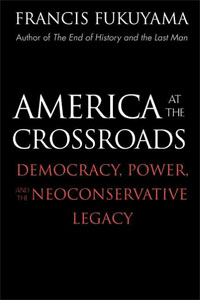Book Notes
 Francis Fukuyama, America at the Crossroads: Democracy, Power, and the Neoconservative Legacy (New Haven: Yale University Press, 2006), 226pp.
Francis Fukuyama, America at the Crossroads: Democracy, Power, and the Neoconservative Legacy (New Haven: Yale University Press, 2006), 226pp.
In 1992 Francis Fukuyama, professor of Political Economy at Johns Hopkins University, published his controversial book The End of History and the Last Man in which he argued that humanity had made no significant political progress since the French Revolution and that the collapse of communism in 1989 signaled the “end” of history. By “end” Fukuyama meant that western, liberal democracy had triumphed over all political options. He revised his thesis a decade later in Our Posthuman Future; Consequences of the Biotechnology Revolution (2002), not because he thought it was wrong, but because he failed to consider the role of science as perhaps the chief engine that drives human history. Science drives any number of interests—technological, economic, ethical, social, and so on, but Fukuyama realized that it also increasingly drives our political life.
A speech at the annual dinner for the conservative American Enterprise Institute in February 2004 by the syndicated columnist and leading neoconservative Charles Krauthammer caused Fukuyama to change course again, this time rather drastically. Krauthammer's speech came about a year after America's invasion of Iraq, and described the war as a virtually unqualified success. Whereas everyone applauded, Fukuyama was flabbergasted. Although for a long time he regarded himself as a leading neoconservative, he concluded that he could no longer support neoconservativism as "a political symbol and a body of thought." His newest book is thus "an attempt to elucidate the neoconservative legacy, explain where in my view the Bush administration has gone wrong, and outline an alternative way for the United States to relate to the rest of the world."
In his longest chapter Fukuyama considers "The Neoconservative Legacy" (pp. 12–65), starting in the 1940s with its two "godfathers" Irving Kristol and Norman Podhoretz. He argues that neoconservativism's detractors "vastly overstate the uniformity of views that has existed within the group of self-identified neoconservatives since the 1980s." But he also admits that most people understand neoconservativism as it was later shaped by Robert Kagan and William Kristol. Despite the disclaimer about any party line, Fukuyama identifies four basic principles of neoconservativism: the belief that the internal character of regimes matters and that foreign policy must therefore promote liberal democracies (since they are friendly and therefore not dangerous); the belief in the use of military power for moral purposes; a distrust of ambitious social engineering projects (a huge irony, to say the least, given American interventionism); and skepticism about the legitimacy and effectiveness of international institutions.
At least in his first term, says Fukuyama, Bush was not an ideological neoconservative; his horrible errors involved lack of prudence and the implementation of policies (overstated threat assessments, underestimated global anti-Americanism, and wildly over-optimistic about the reconstruction of Iraq) rather than mistakes of underlying principles. By now, though, Bush's name is forever linked with preventive war, regime change, unilateralism, American exceptionalism, and benevolent hegemony, all of which Fukuyama now either rejects or greatly qualifies. Nor does the rest of the world think we have been morally good, wise, or trustworthy in the use of our might as the world's only superpower. They resent and distrust us, and restoring our credibility will require concerted efforts over a long time.
"It seems very doubtful at this juncture," writes Fukuyama, "that history will judge the Iraq war kindly." The war has emboldened jihadists, fostered anti-American resentment among both friends and enemies, created a weak Iraq that will remain heavily dependent upon the United States economically and militarily, spent hundreds of billions of dollars, sacrificed tens of thousands of lives, and distracted us from broader issues, all at a huge political cost. Fukuyama proposes what he calls a "realistic Wilsonianism" that pushes back from discredited neoconservativism and is characterized by drastic demilitarization, greater multilateralism, renewed efforts to create international institutions that are effective and legitimate (he believes the United Nations is discredited), and sustained commitment to development. How these generalities will effectively combat terrorism remains unclear. Clearly, in his latest view, global history is far from over. To find out where he thinks it is going, tune in to his new journal The American Interest, meant to supercede his neoconservative past.


